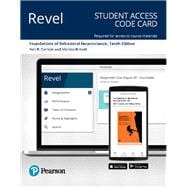For courses in Physiological Psychology or Biopsychology
A streamlined overview of behavioral neuroscience
Revel™ Foundations of Behavioral Neuroscience offers a concise introduction to behavioral neuroscience with a good balance of human and animal studies. Authors Neil Carlson and Melissa Birkett help students grasp the key concepts of the discipline, apply theory and research findings to daily life, and better understand their own behavior. Along with the fresh perspectives brought by new co-author Melissa Birkett, the 10th Edition incorporates the latest studies in this rapidly changing field as well as a new dedicated chapter on movement, added in response to faculty feedback.
A streamlined overview of behavioral neuroscience
Revel™ Foundations of Behavioral Neuroscience offers a concise introduction to behavioral neuroscience with a good balance of human and animal studies. Authors Neil Carlson and Melissa Birkett help students grasp the key concepts of the discipline, apply theory and research findings to daily life, and better understand their own behavior. Along with the fresh perspectives brought by new co-author Melissa Birkett, the 10th Edition incorporates the latest studies in this rapidly changing field as well as a new dedicated chapter on movement, added in response to faculty feedback.
Revel is Pearson’s newest way of delivering our respected content. Fully digital and highly engaging, Revel replaces the textbook and gives students everything they need for the course. Informed by extensive research on how people read, think, and learn, Revel is an interactive learning environment that enables students to read, practice, and study in one continuous experience — for less than the cost of a traditional textbook.
NOTE: Revel is a fully digital delivery of Pearson content. This ISBN is for the standalone Revel access card. In addition to this access card, you will need a course invite link, provided by your instructor, to register for and use Revel.











